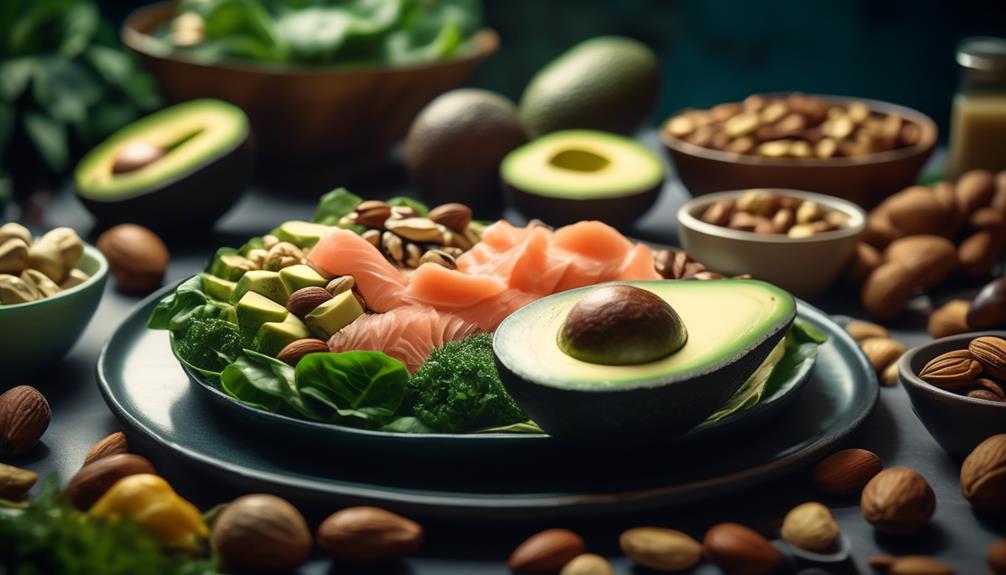Are you searching for a sustainable way to support your heart health? Look no further than the keto diet.
This low-carb, high-fat eating plan has gained popularity for its potential benefits in weight loss, but did you know it could also improve your heart health? By understanding the ketogenic diet and incorporating heart-healthy foods, you can take steps towards a healthier heart.
But how exactly does the keto diet work its magic? Stay tuned to find out more about this intriguing approach to heart health.
Benefits of the Keto Diet for Heart Health

The Keto Diet offers several potential benefits for heart health, making it a popular choice for those looking to improve their cardiovascular well-being.
One of the main advantages of the Keto Diet is its ability to promote weight loss, which is beneficial for heart health. Carrying excess weight puts additional strain on the heart and increases the risk of developing conditions such as high blood pressure and heart disease. By following a low-carb, high-fat diet like the Keto Diet, you can shed those extra pounds, reducing the burden on your heart.
In addition to weight loss, the Keto Diet has been shown to improve several risk factors associated with heart disease. It can help lower levels of triglycerides, which are a type of fat in the blood. High levels of triglycerides are linked to an increased risk of heart disease. The Keto Diet also tends to increase levels of HDL cholesterol, often referred to as 'good' cholesterol. HDL cholesterol helps remove LDL cholesterol, the 'bad' cholesterol, from the bloodstream, reducing the risk of arterial plaque buildup and heart disease.
While the Keto Diet offers potential benefits for heart health, it's essential to consider the potential risks and long-term effects. The diet is highly restrictive and can be challenging to maintain. It eliminates many food groups, including fruits, whole grains, and legumes, which are important sources of essential nutrients. This restriction may result in deficiencies if not carefully planned and monitored. Additionally, the high intake of saturated fats in the Keto Diet may increase levels of LDL cholesterol, which could be detrimental to heart health in the long run.
Understanding the Ketogenic Diet
To understand the Ketogenic Diet, it's important to grasp its core principles and how it affects the body's metabolism. The Keto Diet is a low-carbohydrate, high-fat diet that has gained popularity for its potential benefits in weight loss and improving heart health. However, there are some misconceptions surrounding the Keto Diet that need to be addressed.
One common misconception is that the Keto Diet is a high-protein diet. While it's true that protein intake is important on the Keto Diet, it isn't the main focus. The primary goal of the Keto Diet is to induce a state of ketosis, where the body burns fat for fuel instead of carbohydrates. This is achieved by severely restricting carbohydrate intake and increasing fat consumption.
Another misconception is that the Keto Diet isn't sustainable in the long term. While it's true that the Keto Diet requires a significant dietary shift, many individuals have successfully followed this diet for extended periods of time. However, it's important to note that long-term effects of the ketogenic diet are still being studied, and more research is needed to fully understand its potential benefits and risks.
Incorporating Heart-Healthy Foods Into the Keto Diet

After gaining an understanding of the core principles and misconceptions surrounding the Ketogenic Diet, it's important to explore how heart-healthy foods can be incorporated into this dietary approach.
The Keto Diet focuses on consuming high amounts of fats, moderate protein, and very low carbohydrates. While this may seem counterintuitive to heart health, there are ways to make it work.
Here are some heart-healthy foods you can incorporate into your Keto Diet:
- Heart healthy fats: Opt for healthy fats like avocados, olive oil, and nuts. These fats are rich in monounsaturated and polyunsaturated fats, which can help lower bad cholesterol levels and reduce the risk of heart disease.
- Low carb fruits: While fruits are generally higher in carbohydrates, there are some low carb options that can still be enjoyed on the Keto Diet. Berries, such as strawberries, raspberries, and blackberries, are low in carbs and high in antioxidants, vitamins, and fiber.
- Fatty fish: Incorporate fatty fish like salmon, mackerel, and sardines into your Keto Diet. These fish are excellent sources of omega-3 fatty acids, which have been shown to reduce inflammation, lower blood pressure, and decrease the risk of heart disease.
- Leafy greens: Include leafy greens like spinach, kale, and Swiss chard in your meals. These greens are packed with vitamins, minerals, and antioxidants that promote heart health.
Tips for Following the Keto Diet Safely
To safely follow the Keto Diet, it's important to implement certain tips that will help you navigate this dietary approach with confidence and optimize your health. The Keto Diet has gained popularity for its potential to promote weight loss and improve insulin sensitivity. However, it's crucial to approach this diet safely and responsibly.
Firstly, when following the Keto Diet for weight loss, it's important to focus on consuming healthy fats, such as avocados, nuts, and olive oil, while limiting your intake of processed foods and sugars. This will help you achieve ketosis, a metabolic state in which your body uses fat for fuel instead of carbohydrates.
Secondly, it's vital to monitor your nutrient intake to ensure you're getting all the essential vitamins and minerals. Since the Keto Diet restricts certain food groups, such as fruits and grains, it's important to include a variety of low-carb vegetables, such as leafy greens and cruciferous vegetables, to ensure you're meeting your nutritional needs.
Lastly, it's crucial to listen to your body and adjust your diet accordingly. Some individuals may experience side effects when first starting the Keto Diet, such as the 'keto flu,' which can include symptoms like fatigue and headache. Staying hydrated, increasing your salt intake, and gradually reducing your carbohydrate intake can help alleviate these symptoms.
Monitoring Heart Health on the Keto Diet

Monitoring your heart health is a crucial aspect of following the Keto Diet. While this low-carb, high-fat diet has shown potential benefits for heart health, it's important to track your progress and be aware of potential risks. Here are some key points to consider when monitoring your heart health on the Keto Diet:
- Regular check-ups: Schedule regular appointments with your healthcare provider to monitor your heart health. They can assess your blood pressure, cholesterol levels, and other vital signs to ensure that the diet isn't negatively impacting your cardiovascular system.
- Tracking dietary intake: Keep a record of what you eat and drink. This can help you identify any patterns or potential triggers that may affect your heart health.
- Electrolyte balance: The Keto Diet can cause an electrolyte imbalance, which may increase the risk of heart complications. Monitor your electrolyte levels and consider supplementation if necessary.
- Listening to your body: Pay attention to any symptoms or changes in your heart health. If you experience chest pain, palpitations, or shortness of breath, seek medical attention immediately.
Conclusion
In conclusion, the keto diet can be a beneficial way to improve heart health when done safely and with the right balance of heart-healthy foods. By understanding the principles of the ketogenic diet and incorporating nutrient-rich options, individuals can support their heart health while enjoying the benefits of this eating plan.
However, it's important to monitor heart health regularly and consult with a healthcare professional to ensure safety and effectiveness.
Are you ready to take charge of your heart health with the keto diet?







